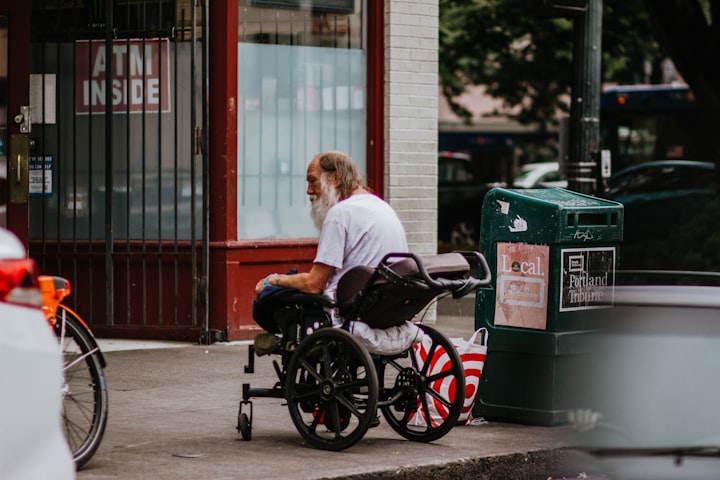Long Shadows
When the shadows were lengthening we entered the nursing home.

Most of Grandpa's hair had been trampled out by the ages. What was left huddled in nervous fringes about the ears and neck. This I noted anew that sultry July evening when the shadows were lengthening and I and my wife entered the Three Rivers nursing home. We discovered him in a wheelchair, aimlessly poking about the room. His chair cut a corner and caught one of two beds, dragging it more centrally on the floor.
He rolled into a corner, bumping the walls, backing off, and smacking them again. Observing the half dozen mini-crashes that followed, I fancied him a voyager, piloting a wooden craft through stormy straights, fighting to break into open waters. The metal frame vibrated with the old man's energy, denoting a perfect symbiosis of flesh and machinery. There was ample time to observe and make mental notes, for Grandpa seemed totally unaware we had come in for a visit. I became so focused on the saga unfolding before me that I unintentionally snubbed my step-grandma, a passenger on the bed that traveled. Grandma, who could not sit up on her own, employed a bank of pillows to elevate her head enough to see about the room. She had the wit to summon the would-be Odysseus back from the sea of imagining by calling his name.
"Johnny."
On the third try, he wheeled around and confronted me. It was a reunion seventeen years in the making. I drank in the bald pate that wrinkled into a sun-ravaged brow, scant eyebrows, prominent Dutch nose hanging like a decayed monument over a mouth drawn in by shriveled tissues, wrapped on toothless gums. His ears were huge because all the rest of him had shrunk. Grandpa gazed up from his seat with eyes wider than an owl's. They made great red circles, with dark, dried-out balls at the center. I detected not a glimmer in those orbs, no hint of recognition. He turned to Grandma for help.
"Clara, who is this?"
"It's one of Sadie's boys."
"I'm Mitchell."
Grandpa was bewildered. His attention fluctuated between me and Grandma, in the end tossing the burden of it back at Grandma.
"Who is this, Clara?"
"He's one of Sadie's boys."
"Is this someone you knew before you met me?"
"No; he's one of Sadie's boys."
The conversation limped in this vane for several minutes. At last, on determining that he was not going to recognize me, I told my grandparents I had to go, but that we would return the following day. To my wife, Katy, these two were strangers. Through the whole encounter, she stood silently by the door. She now preceded me into the hallway. I bent over Grandma�'s bed.
"I'll see you tomorrow."
Her eyes were closing as I passed through the door. With one last glimpse at the old man, who still looked about in utter confusion, I pulled the white slab shut and walked away. Had I not been at a loss how to cope with it, I would right then have completed my mission, which was far more complex than a simple visit. Next time, I intended to pursue it to a conclusion.
We drove the brick-oven hot streets to my Aunt Mary and Uncle Andy's decaying trailer home, where we spent the night. Early enough, we prepared for the grueling ride to Houston, with first a quick looking in on Grandma and Grandpa. Expecting a repeat of yesterday's encounter, we pulled into the parking lot and approached the main entrance. One of the residents, a lanky, grizzled old boy, who reminded me somewhat of Uncle Andy, had come into the sunlight and stepped out of his trousers. One of the attendants flew down the steps, frantic to dissuade him. We were recognized and smiled at as we passed the desk. On both visits, the staff made us feel welcome and reassured as to the quality of professionalism within the organization. I turned the brass colored knob.
Grandpa sat squarely before me, staring hungrily at the center of the entranceway. It is my opinion he had planted himself there all morning, hoping I would keep my word to return. Over my greeting he piped an important announcement.
"I couldn't talk to you yesterday, but I can, now."
"Hey, I'm glad. Morning to you, Grandma."
"Where's the rest of the boys?" He sounded like the Grandpa of old, referring to my six brothers.
"Scattered everywhere."
His head swiveled to survey the room.
"It costs us five dollars a day to live here. We've been in this place three years. I don't have to stay, but she - I came to be with her."
Perhaps that was true, Grandpa when you were new here. Now, you'd be somebody's burden.
He joined me in examining a collection of family photos thumbtacked to a wall. His crooked finger indicated a young person wearing a suit.
"That's me."
It was in fact his son, Robby, who looked just like him there.
Grandma took me by surprise. "Is Rusty dead?"
I regarded her tired features with mixed pity and tenderness. Poor Grandma. Flat on her back, she looked worn and resigned from the world and had been like that since I first knew her, at age fourteen. The several times I saw the woman on her feet she went shopping. What I'm saying is, the present situation was no great change of lifestyle.
"Rusty was killed in a wreck in 1969."
No need to dredge up the fact my brother got murdered.
"I thought he was dead."
But our focus remained on Grandpa, whose eyes had gotten lustrous. I contemplated his once powerful hands, grasping the rubber of the wheels, withered claws. When young, they wrested homes out of the raw materials of the building trade. I had been with him, once upon a time. He gave me my first job. For seven dollars per day I worked through eight and ten-hour ordeals in the south Texas weather - miserable in cold, rainy winters, broiling in godless summers, often bedding on top of two-by-fours laid across sawhorses. His spine straightened, as he recalled his days in the sun. He continued transforming and reverting to the Grandpa I knew, and he rhapsodized, building a monolog which we were content to harbor in chairs and merely listen to. Because he tended to mumble, I rarely understood much that he said. My voice was like his, and he was hard of hearing, so you can imagine the conversations we had.
"I built over a thousand houses." He grinned, looking at Katy and I as though we were a whole stadium-full of listeners. "That was enough, wasn't it?"
He focused on episodes and issues my brothers and I would remember. And then it started. Interlaced with the tales were barbed references to me. "Mitchell didn't like it " It would seem he hadn't a clue which of my clan sat before him, freeing him to take potshots - and yet, a glimmer of recognition lurked, covertly, somewhere inside that pea brain of his. Else, why single me out, of all my brothers, and remind me of a whole lifetime of issues? In 1957, the merry old fart borrowed my mom's rent money, two days before due date, without coming back or ever mentioning it again. He formed a habit of blatantly keeping my wages as his own. Four times I worked for him; four times he kept whole paychecks.
The summer we operated out of Crystal City was when Grandpa crossed the line. Rusty and I, along with three Mexicans, were his crew, throwing together shell houses, laboring a full seven days for weeks on end. After the first couple of pay periods, we got increasingly short-changed. Manuel, a fellow carpenter, insinuated himself into our confidence, ferreting out our discontent. The gossipy asshole passed all information to Grandpa.
"I asked how he was going to pay all that money. He answered, 'I won't. I'll just say I charged it up to room and board.'"
Once, I strolled past their conversation, as Grandpa told Manuel, "Mitchell thinks he's number one. He ain't number nothin'." I truly believe he spoke without justification, yet I kept quiet. One reason, Rusty was the figurehead in my family. I kept my cool because he was so darned unshakable. No confrontations, no sulking, solely because of him. Rusty had been forced to grow up early, taking on the feeding of our entire family at the age of sixteen. I bided, roiling inside, smooth as a quiet pond on the outside. When big brother told me, "We're going home," I applauded and packed my bag, for it never seemed sweeter. In the old "Gray Ghost", Rusty's �'52 Ford convertible, with the radio blaring, we shuttled home.
After about a week, Grandpa made a pit-stop of his own, since Grandma lay at home while he pursued the trade. Then, wondering if Rusty or I were interested in coming back to Crystal City, he waltzed into the house, bubbling with good cheer. He effervesced across the room, finally foaming over to me. "Hmm," he grunted, grinning, tapping his feet at mine in a game called "I�'ll make him move." Angrily, I turned away, for, when he did not offer money, forgiveness got murdered.
"Well, if you want to be that way about it "
At the moment, I did. From that juncture Grandpa severed the tie of grandfather to grandson with me, for the rest of his life undercutting me at each opportunity, never acknowledging my first wife and children, spreading malicious gossip. "Screw 'im," I figured. Our families drifted apart, not caring who lived, who died.
In the succeeding years, Rusty became involved with a woman engaged in a bitter divorce. Her husband ran them over with a ¾-ton pickup truck. Mom grieved herself to death over it and I eventually divorced, soon thereafter to marry Katy. Seventeen years beyond my mother's funeral, we found ourselves getting regaled by my grandpa, who was ninety-seven. I had a task to perform, just as soon as the old bastard quit talking, as, eventually, it had to end.
He wound to a close, then posed as we snapped a few photos.
"Grandpa," I said, standing over him
He allowed me to hug him - hug a set of bones, really. They were the frame of a big human being, but the human being was slowly abandoning ship. I in that moment accomplished my mission. All the anger, hurt, humiliation, and betrayal went down like a row of palm trees in a hurricane. My hatchet was buried.
"I love you, Grandpa."
He had not received such a hug in all his years, guaranteed.
"See you Christmas," I promised.
"Bring the rest of the boys," he said eagerly.
During the course of the visit he had seemed to drop thirty years. Now he was reluctant to turn back. We left him there, waiting for Christmas.
* * * * *
I never saw him again. He developed a painful condition that nearly cost him his life several times. Each time the doctors revived him, but could not stanch the pain. So then they let him die to be at peace. We visited Grandma one last time. She appeared to drift in and out of consciousness, not really able to respond to us. At one point she looked up and said to me, "You have a house. Over there?" She shut her eyes then and appeared to be sleeping. I kissed her cheek
"We're going to leave you now, Grandma. I just want you to know that we love you and we're happy we got to see you."
About the Creator
Charles Turner
My work is based on who I am now and have been in the past. It is based on a lifetime of reading. Autobiography, standard fiction, sci/fi, fantasy, westerns. I plan to put together a collection of short stories to publish via Amazon.






Comments
There are no comments for this story
Be the first to respond and start the conversation.